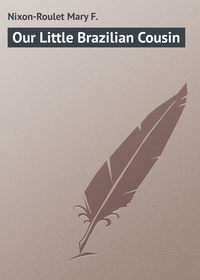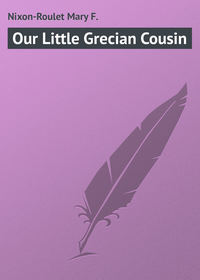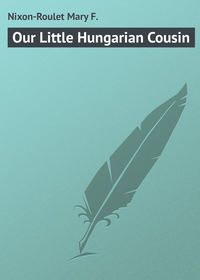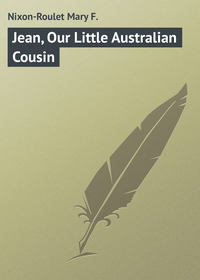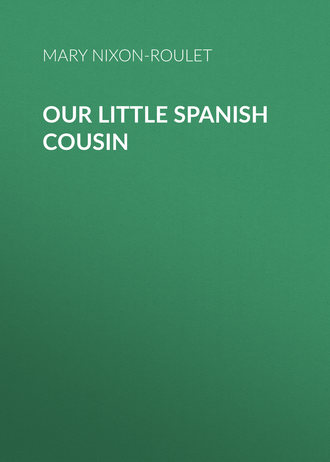 полная версия
полная версияOur Little Spanish Cousin
"'How many oranges are there here?' asked the king, smiling genially, and the judges replied:
"'Ten, may it please your Gracious Majesty.'
"'Nay, but it does not please my Gracious Majesty to have four fools for judges,' he said. 'Liars! Can you not see that there are but five?' and he raised two of the halves and held them together. 'Know, oh, unjust judges,' he said, sternly, 'that the king's servants must see more than the surface of things if they are to conduct that portion of the realm which it is their business to attend to, and since you cannot tell a half from a whole, perchance that is the reason of the tales I hear of your ill-dealings with the property of some of my subjects!'
"He ordered them to be beheaded and their places filled with better men, and the poor people whom they had defrauded had their property restored to them. There are many other stories of King Pedro which are not pleasant to tell, and it is good to remember that he sometimes did kind things."
"Thank you," said Fernando. "What is the Alcazar where the gardens were?"
"It is a very remarkable place, and when you go to Sevilla you will see it. At first, hundreds of years ago, when the Romans were in Spain, it was the house of Cæsar; afterward the Moors turned it into a fortress, and it is a perfect example of Moorish work. Don Pedro rebuilt it, and spent a great deal of money upon it, making it the most beautiful palace in all Spain. All manner of things happened there, among them the murder of Don Pedro's half-brother, Don Fadrique, who he was afraid would lay claim to the throne.
"But here come your mother and Juanita, and I think your rest time is about over. Go and play, and tell Manuel we return at four o'clock, so you must be on time."
So Fernando spent a delightful afternoon in the orange grove, and drove home through the cool twilight, passing the paseo just as the band was playing the Marche Real, the national song, which he hummed until he went to bed.
CHAPTER IV.
AT THE ALHAMBRA
"Mi madre," cried Fernando, rushing into the house one day in October, "to-day is the feast-day of the head master, and we have a holiday. May I have permission to go to the hill to see Antonio?"
"Not by yourself, my son," replied his mother, and Fernando said, hastily, "Oh, no, madre mia, Manuel says that he will take me if you will permit me, and, if Juanita's nurse could be spared, we could take the niña, as she has never been there, and that would give her pleasure."
"Let me see," his mother paused a moment, "the day is fine. This morning I am busy, but after luncheon I will drive thither with the little one, and leave you for an hour while I go on to the villa of the Señora Sanchez; but you must be a good boy, and mind Manuel."
"Yes, mother, and you will see Antonio, whom I like best of all the boys at school," said Fernando, and he hastened away to make ready for the great treat. A drive with his mother in school hours was a pleasure seldom indulged in, and a visit to the great hill which crowns Granada was treat enough, but to take Juanita, – these were things so pleasant that he said to himself, "I think my guardian angel must have whispered in my mother's ear to give me all this pleasure."
It was about two o'clock as they drove through the narrow streets of the city up the steep and hilly way which led to the outskirts of the town.
"You are going to see the nicest boy in Granada, and the most wonderful castle in Spain, niña," said Fernando to Juanita, and the two children chattered merrily as the carriage went slowly up the hill.
"Here is a riddle I heard at school, niña, see if you can guess it, —
"'Guarded in a prison strait,Ivory gaolers round her wait,Venomous snake of sanguine hue,Mother of all the lies that brew!'""I do not know," said his little sister, wonderingly. She thought all that Fernando said and did was perfection. "What is it, Nando?"
"Why, the tongue, of course," he said, pleased to have given a riddle which she could not guess; and his mother said:
"That is a very good riddle, and I hope you will remember it, for it is the tongue which makes much mischief in this world. Remember that 'a stone and a word flung do not return.'"
"There is Mazo following us," said Juanita, and her mother said, laughingly, "Really, Fernando, I don't see why you like that dog so much! He is uglier than Picio."2
"He isn't handsome, but you have told me that handsome is as handsome does!" said her son, and his mother laughed again.
"Oh, what is that?" cried Juanita, as the carriage made a turn, and some splendid great towers came into view.
"That is the Alhambra," said Fernando. "It is the most wonderful castle in Spain. Manuel said it was begun in 1238, in the reign of the Moorish king, Ibn-l-Ahmar, and it was years and years in building. He says the Moors used to have the castle and the city of Granada, and I read in my history of how the Catholic king, Ferdinand, came here to conquer it. He fought and fought, but the Moors wouldn't give it up. I think they were a brave people, if they were beaten, don't you?"
"Yes, my son, they were very brave, but they did such cruel things to the captives they took, that it is not surprising that the Spaniards wanted to conquer them," said his mother.
"They captured Christian girls, and forced them to become their wives, though what they wanted with them I cannot see, for they already had many wives, and I should think one was enough for any man. Where shall we find your friend, Fernando? If you wish I will leave you with him for an hour, and continue my drive."
"Oh, thank you, mother, I knew you would let me stay!" cried Fernando; and Juanita said, "Please leave me, too, mother, that I may see Antonio and the great palace."
"Antonio lives within the palace, mamma," said Fernando. "He was born there, and he and his sister, Pepita, have never been away. He is to go to the English school at Gibraltar, but not until he is bigger. May we ask some one where he is?"
"Certainly. He must be a nice boy to have lived always in such a place, and to have you so devoted to him. There is a guard; ask him where the apartments of the boy's father are," she said to Manuel, who sat upon the box with the coachman. Further inquiry, however, was not necessary, for, as the carriage made its way up the broad drive shaded with magnificent elm-trees, which the Duke of Wellington planted, a boy came bounding toward them.
"There he is," cried Fernando. "Antonio, come here, we have come to see you."
The carriage stopped, and Fernando hopped out as lightly as a squirrel, giving Antonio a good hug, for Spanish boys are never ashamed of showing that they like their friends. Antonio's cap was off in a trice and he smiled and bowed as Fernando presented him to his mother and little sister. Antonio was a handsome boy, with eyes as dark and blue as the sapphire of the Spanish skies, and fair hair tossed back from an open brow. All Spaniards are not dark, and, in Andalusia, the province in which Granada lies, there are many blonds.
"I will leave Fernando and Juanita with you for a visit," said the señora, graciously. "Will you bring them here in an hour?"
"Si, señora," said Antonio. "But if you would so honour us, the señora, my mother has prepared a little luncheon in the Garden of Lindaraya at four o'clock, and she would be most happy if you would partake of it with us."
"Thank you, then I shall allow the children to remain with you until that time and I shall myself prolong my visit with my friends at the villa," she replied. "When I return I shall do myself the pleasure of meeting your mother."
So she drove off, and the children tripped happily away, followed closely by Manuel and Dolores, for Spanish little ones of good family are never allowed to go about alone. However, one must relax a little sometimes, and the two attendants saw a pleasant hour before them as they sat idly about while the children played in the wonderful gardens of the palace. Pepita, Antonio's sister, was but a year older than Juanita, and the two little girls were quite happy together, and the boys did not consider themselves too big to play with them. They played hide and seek through the marble halls, and tag and chaser about the flower beds. The little girls played house and made mud pies, although Dolores objected to this and told Juanita that she would be as dirty as the "caseada de Burguillos"3 if she were not more careful. Juanita thought Pepita was wonderful because she had been born in a palace, and her father was custodian of the wonderful place, but it was Antonio who claimed her greatest admiration. He was even more marvellous than Fernando, she almost thought, because he was bigger, and his eyes had such a kind and merry look, and he always carried her over the rough places in his strong young arms, and lifted her over the walls as they strolled through the gardens.
She had never seen such gardens as these of the Alhambra. They were full of the most beautiful flowers, and there was the most delicious scent in the air.
Antonio told her it was from the wallflowers, which grew here in great profusion, and were twice as large as they were in other places. But besides them there were great trees of purple heliotrope, the blooms as large around as Juanita's big hat; and geranium-trees, taller than a man, with orange-trees in bloom, late though it was, and with the ripe fruit upon their branches also.
Then the children had a charming luncheon on the grass, for Antonio's mother set forth for them all manner of good things, – a dainty salad with some cold meat, thick chocolate in tiny cups, and cakes in the daintiest of shapes. What a merry picnic it was beneath the shade of the great orange-tree which Antonio told them had been there for over a hundred years, and from which the great American, Washington Irving, had picked fruit when he lived at the Alhambra! Then when the party was over, and his mother had not come, Fernando said:
"Antonio, tell us a story. You know some about the castle, I am sure." And little Juanita begged, "Do please tell us one, Antonio," and as nobody could ever resist the niña's wistful, brown eyes, Antonio smilingly began the story of "The Three Sisters."
CHAPTER V.
ANTONIO'S STORY
"Once upon a time," Antonio began, "there were in the palace of the Alhambra three princesses whose names were Zayde, Zorayde and Zorahayda. They were daughters of the Sultan, for it was in the days when the Moors reigned in Granada, and there were no Christians here but captive Spaniards. The princesses were kept in a tower called the Tower of the Infantas, one of the most beautiful towers of the Alhambra. It was fitted up in a manner befitting the home of the king's daughters. The walls of the room were hung with tapestries in cloth of gold and royal blue; the divans were heaped high with pillows, the pillars and arches which held up the roof itself, were in filigree of softest hues, – blue, terra-cotta, and gold. The Princess Zayde's chamber was the richest, all in cloth of gold, since she was the eldest Infanta; that of Zorayde was hung with steel mirrors, burnished bright, for she was most fair to look upon and loved to look upon herself; while that of the youngest, little brown-eyed Princess Zorahayda, was delicate in tone, as if some rare jewel lay in a dainty casket. Upon the princesses waited the discreet Kadiga, an elderly duenna who never let them from her sight for a moment. She watched them as a cat does a mouse, but there was one thing she could not control, and that was the eyes of the princesses. They would look forth from the windows, and, indeed, this Kadiga never forbade, for it seemed to her a pity that three such fair maidens should have so little amusement, and she thought it could not possibly hurt them to gaze into the gardens below.
"One day, while the princesses were looking out the narrow windows, they saw something which made them look and look again. Yes, it was true, – could it be? it was! They were the very same – the three Christian princes whom they had seen at Salobrena; but here they were labouring as captives. At the tourney to which the princesses had been taken, they had seen these noble knights, and had fallen in love with them, and it was for this that their father had shut them up in a tower, for he had said no daughter of his should marry a Christian.
"But the knights thought differently, and they had come to Granada in the hope of finding their princesses, and had been taken captive and were compelled to hard labour.
"'It is he!' cried Zayde. 'The knight with the scarlet tunic is the one I saw!'
"'Yes, but the one in blue, he is mine!' cried Zorayde.
"Little Zorahayda said nothing, but she looked with all her eyes at the third knight. And this was not the last time she saw him, for the knights had come thither, bent on rescuing the maidens, and had bribed their jailer to help them to escape. So one moonlight night, when the moon was turning into silver beauty the orange-trees of the garden, and shining in fullest light into the deep ravine below the Tower of the Infantas, the knights awaited their lady-loves in the valley below, and Kadiga let them down by a rope-ladder.
"All escaped in safety but little Zorahayda, and she feared to go.
"'Leave me,' she cried. 'I must not leave my father!' and at last, since they could not persuade her to go, they rode sadly away without her, and her little white hand waved a sad farewell to them from the window. There she still is, so say the legends, and there are those who, walking in these gardens at midnight, tell that they have seen a white hand wave from the tower window, and a voice whisper through the murmur of the fountains, 'Ay di mi Zorahayda!'"
"Oh, Antonio! hast thou seen her?" cried Juanita, and her brother laughed, and said:
"Little foolish one, it is but a story! But Antonio, tell us a tale of battle, for this is but a woman's story, and there have been splendid deeds done in this old castle."
"Splendid ones, and sorry ones as well," said Antonio, who was old for his twelve years, and had lived so long in the atmosphere of romance that he seemed a part of it, in speech and manners. "Shall I tell you of the taking of the Alhambra from the Moors? It was a glorious fight, and both sides were brave men."
Then he told them of the conquest of Granada, when Christian knight and Moor fought valiantly for the possession of the splendid city, with its gem, the Alhambra. He told of how the noble knight, Juan de Véga, was sent to demand tribute from Muley ben Hassan, King of Granada, and that fierce old monarch said:
"Return to your sovereigns, O Spaniard, and tell them that the kings of Granada who paid tribute are all dead. My mint coins only swords!" Brave words, but it was his son, Boabdil the Unlucky, who was forced to surrender the castle to the victorious enemy, and who handed the keys to the Spaniards, as he rode through the gate of the Siete Suelos, saying: "Go, possess these fortresses which Allah has taken from me, but grant me this one boon, that none other shall pass under this gateway from which I have come out." And Ferdinand granted his request and walled up the gate, so that, from that day to this, no one has passed through that entrance.
These and other tales Antonio told them, and the afternoon passed so quickly that the children were surprised when their mother's voice warned them that it was time to go home.
"Oh, mamma," they cried, "must we go?" and the señora smilingly waited a little, chatting with Antonio's mother, while he picked a huge bunch of flowers for the children to carry away with them. Then the good-byes were said, and they drove away crying:
"Come soon to see us, Antonio." To which he replied, in pleasant Spanish fashion:
"Thank you well, and very much for your visit!"
"Isn't he a nice boy?" said Juanita.
"Quite a little Don," her mother answered, smiling. "Fernando, I am glad to see that you have the sense to choose your friends so well," and Fernando grinned, boylike, well pleased.
"Oh, who is that?" Juanita asked, as a fantastic figure approached.
"That is the gipsy king," said her mother. "You know the gipsies live all huddled together there, below the Alhambra, and they have a chief whom they call king. They are a lazy set, doing little but thieving and telling fortunes. They live in little burrows, like rabbits, set into the hillsides, and there are pigs, goats, and dogs all living together with the people."
"That girl with the king is very pretty," said Fernando, "with her black hair and eyes, and her bright skirts, and the pomegranate flower behind her ear."
"The pomegranate is the flower of Granada, you know," said his mother, "and it does look pretty in her dark hair. Hear her call her dogs! Gipsy dogs are all named Melampo, Cubilon, or Lubina, after the shepherd dogs who followed the shepherds, and saw our Lord at Bethlehem. Ah, Juanita, 'Jesus, Maria y Josef!' You must not sneeze! Drive faster, Diego, and Dolores, wrap the baby in that Palencian blanket, so soft and warm. The nights grow cool quickly at this time of year."
"Why do we always say 'Jesus, Maria y Josef!' when people sneeze?" asked Fernando.
"It has been the custom so long that people have almost forgotten why it is done," replied his mother; "but I remember my grandmother saying once that her mother told her the reason. Years and years ago, in 1580, there was in all Andalusia a terrible plague called the mosquillo. People sneezed once, and lo! they had the plague, and little could save them, though some few recovered. So it grew to be the custom, when one sneezed, for those who heard him to look pityingly upon him and say, 'Dios le ayude,'4 or call upon the holy names to help him, saying, 'Jesus, Maria y Josef.'"5
"See that ragged beggar, mamma," said Juanita. "May we not give him something?" as a little boy came hopping along beside the carriage, crying, lustily:
"Una limosna por el amor de Dios,6 señora!"
"I have no centimos,"7 said the señora, "and it is not wise to give more to a beggar, but you can always give politeness, niña, and when you have no money say, 'Perdone me, usted,'8 or, 'Por el amor de Dios,'9 and thus you will not give offence to God's poor."
CHAPTER VI.
THE HOLIDAYS
Fernando had been three months in school and was beginning to grow tired, when it came time for the feast of Christmas, and he was very happy in the thought of all he was to do and see during his holiday. He and Juanita were very much excited in preparing their nacimento, which nearly every Spanish child has at Christmas time. This is a plaster representation of the birth of Christ. There are in it many figures, a manger surrounded with greens, the Baby Our Lord, St. Joseph, and the Blessed Virgin, the Wise Men worshipping the Holy Child, and angels hovering near, as well as the patient ox and ass who were his first worshippers. Juanita was wild with excitement as these were all grouped and set in place. She was only four and did not well remember the Christmas before, so that it was all new to her.
Christmas Eve there was a grand family party, all the relatives coming to the home of Fernando and partaking of a supper of sweetmeats and wine. In the morning there was, of course, early Mass in the great cathedral, where the choir sang divinely. It started way up in the loft to sing the Adeste Fideles, the Church's Christmas hymn for centuries, slowly coming nearer and nearer; and Juanita thought it was an angel choir until she saw it come into sight and the glorious voices rolled forth in a volume of song.
Then the children had breakfast and they made their aguinaldo, for every servant on the place expected a present as surely as did the old darkies of Southern days. The postman, the errand boy, the porter, the sereno who walks the street all night with his lantern, trying your door to see if it is locked properly, and assuring you that all is well as the hours strike, – all must be remembered. Then the señora took the carriage, and the children accompanied her, as she filled it with sweetmeats for the poor children and such of her special protégés as could not come to the house for their aguinaldo.
It was a cold day, for Granada grows cold in the winter time, and is not like other Spanish cities, which have summer all the year. The wind sweeps down from the Sierras and brings with it a blustering hint of mountain snows; and as the houses have no furnaces and seldom good stoves to heat them, even the rich can suffer, and the poor do suffer bitterly.
While the sun shines it matters not, for the sun of Andalusia is so warm and bright that it blesses all who lie beneath it; but when the dark days come or evening's mantle falls upon the town, people hover close about the brazero and long for summer.
With Fernando it mattered little, for he was seldom still enough to be cold, and he spent a merry Christmas, falling asleep to dream of delightful things, and waking to the happy thought that it would soon be the feast of the Circumcision. This is New Year's Day, and is celebrated with much festivity in Spain. The evening before there is a grand party for the grown-ups, and slips of paper are passed around, one being drawn by each person. They are in pairs, so that the one who draws number one must go to supper with number one, and great merriment is made over the pairing off of the guests. The gentleman has to send a bunch of flowers or sweets to the lady whose number he draws, and not a few matches have been made in Spain by this merry custom.
Fernando and Juanita, however, were quite otherwise engaged. They were sent early to bed and were dreaming of the sugar-plums of the morrow, wondering whom they would first meet, for they think in Spain that what happens to you on New Year's Day will determine the course of the whole year. If you meet a pauper you will have bad luck, but if you see a man with gold in his pocket, you will have money all the year.
Merrier still was the feast of the Three Kings, which is the day upon which little Spanish children have gifts made them as American children do at Christmas. This is in honour of the Wise Men having brought presents to Our Lord on that day, so that on the eve of January sixth, the feast of the Epiphany, Fernando and Juanita set their little shoes on their balcony with a wisp of straw to feed the Magi's horses, and with many surmises as to what they would find in them on the morrow. What wonderful things there were! Fernando had all the things that boys love, – tops, marbles, balls, and a fine knife; while Juanita had a wonderful dolly and all manner of dainty things for her to wear. "The Three Kings never make one feel like the governor of Cartagena," said Fernando, as he tossed his new ball and lovingly fingered his knife.
"But there is still another gift for thee and thy sister," said his father, and he led them to the door. There stood a wonderful little donkey, his bridle decorated with streaming ribbons and bells, his kind eyes blinking as he turned his head and seemed to say, "Hello, Little Master, are you and I going to be great friends?"
"Oh, papa, is that for us?" cried Fernando, while Juanita clapped her tiny hands with delight. It took Fernando but a moment to spring on the donkey's back, but his mother cried, warningly:
"Be careful, son! Remember how the little Prince of Granada rode too fast through the streets, and fell from his pony and was killed."
"Have no fear," her husband said, smiling, "the donkey will not go fast enough to hurt him; that is why I selected him." And he placed Juanita up behind her brother, bidding Manuel walk beside them, while Mazo, unbidden, jumped around.
Everything else that Fernando had sank into insignificance when compared to the little donkey, which he named Babieca, and which he and Juanita rode whenever they had a chance. Babieca was a kind little beast, though something of a rogue. He seemed to know that he must play no tricks when Juanita rode him, and he behaved himself well; but when Fernando rode, it was quite another matter. Babieca would prick up his long ears and go along quietly, then stop suddenly without saying "by your leave," and, of course, Fernando would go over his head. He would not hurt himself at all, and the naughty little mule would look at him wonderingly as if to say: "Now what on earth are you doing down there?" Fernando soon grew to expect such antics and was on the lookout for them.




